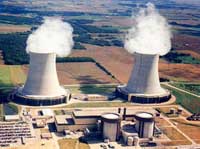Russia to ship fuel for Iranian atomic power plant by March
Senior Iranian and Russian nuclear officials said Moscow has agreed to ship fuel for a controversial atomic power plant it is building in Iran by March, news agencies reported Tuesday, as Iran's nuclear chief met with a Russian security officer at the Kremlin.

The agreement signed Tuesday by Sergei Shmatko, head of the state-run company Atomstroiexport, and Mahmoud Hanatian, vice president of Iran's Atomic Energy Organization, should allay Iran's complaints that Moscow is dragging its feet on supplying fuel for the Bushehr plant.
It will also renew concerns by the West, which accuses Tehran of seeking to enrich uranium in order to build nuclear weapons.
ITAR-Tass reported that Shmatko met Hanatian to sign an additional protocol setting out a timeframe for starting up the Bushehr plant.
"The document provides for supplying Russian fuel for the atomic energy plant in March, physical startup in September 2007 and electric generation by November 2007," Hanatian was quoted as saying by ITAR-Tass.
Shmatko said about 80 tons of fuel would be supplied, Interfax and ITAR-Tass quoted him as saying.
Meanwhile, the chief of Russia's Security Council insisted again on seeking a diplomatic solution to international concerns over Iran's nuclear program at a meeting with Iranian Vice President Gholamreza Aghazadeh, who heads the country's nuclear organization.
"We are firmly convinced of the need to resolve the question of the Iranian nuclear program through the negotiation process," Igor Ivanov said.
"We consider it necessary that Iran should be guaranteed the right to peacefully develop nuclear energy ... and also to remove the concerns of the international community regarding obligations under the nonproliferation regime," he told Aghazadeh.
"We will strictly fulfill our obligations," Ivanov said.
Aghazadeh responded that Iran was satisfied with the agreements signed.
"We achieved a good agreement ... on completing construction of the atomic energy plant at Bushehr, including agreement on a concrete date for directing atomic fuel to Iran," Aghazadeh said.
Iran's foreign minister, meanwhile, told The Associated Press that talks between top Iranian and European negotiators were "on track" and could pave the way for a negotiated solution to the standoff.
Speaking in an interview at the United Nations, Manouchehr Mottaki said Iran still believed there should be no conditions on the resumption of negotiations, implicitly rejecting demands that Tehran first suspend uranium enrichment.
Oil-rich Iran says it needs uranium enrichment to produce fuel for nuclear reactors that would generate electricity, and insists its program is peaceful. Enrichment can also create weapons-grade material, however, and the United States and other nations have accused Tehran of seeking to develop nuclear weapons.
Subscribe to Pravda.Ru Telegram channel, Facebook, RSS!


